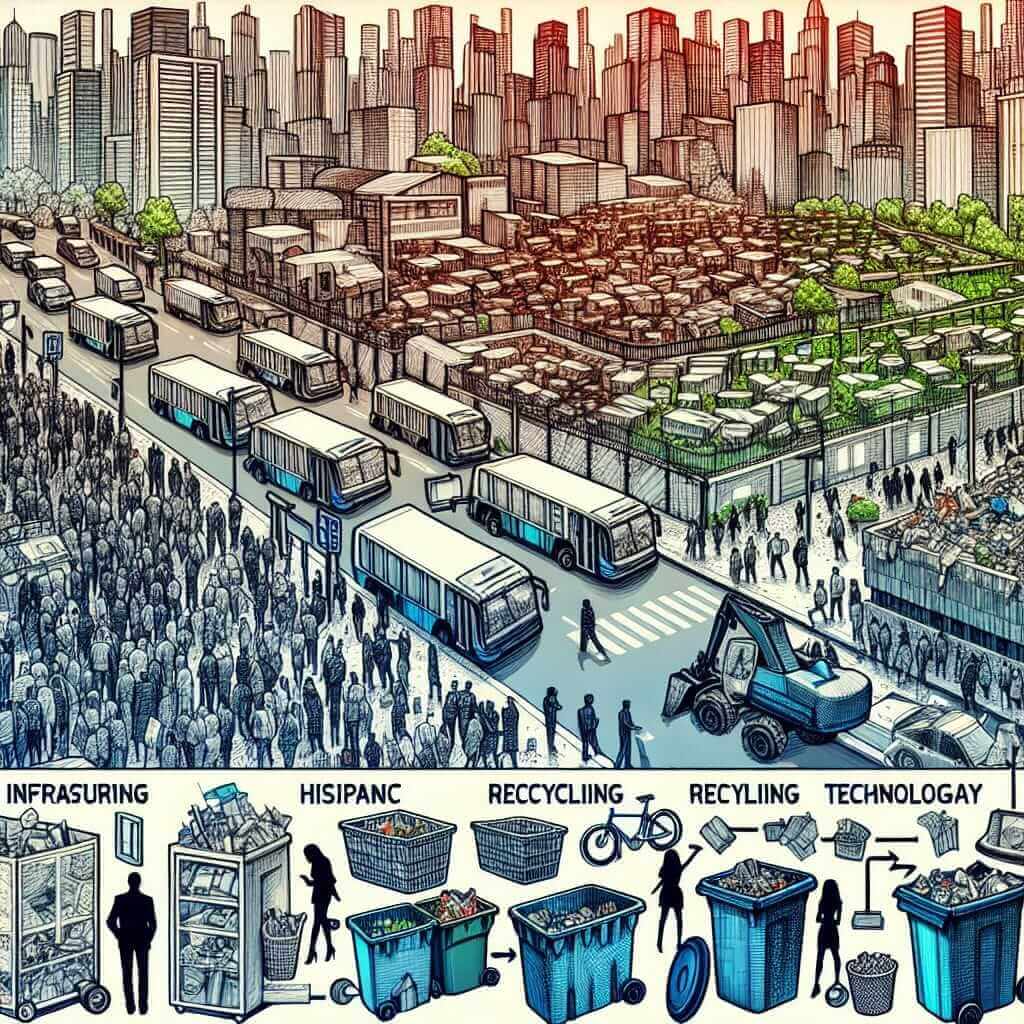The IELTS Reading section is a crucial component of the exam and demands a deep understanding of various texts. One commonly covered topic in IELTS Reading is “What are the challenges of managing waste in urban areas?” This article not only offers a realistic practice test but also analyzes potential questions, answers, and common pitfalls, providing a thorough guide for IELTS aspirants.
Practice Reading Test: Waste Management Challenges in Urban Areas
Easy Text: Understanding Waste Management Challenges
Urban areas worldwide face significant challenges in managing waste, mainly due to rapid urbanization, increased population density, and changing consumption patterns. As cities grow, the quantity of waste generated surges, making it difficult to collect, transport, and dispose of it efficiently. Moreover, improper waste management can lead to severe environmental and public health issues.
One primary obstacle is the lack of adequate infrastructure. Many cities struggle with outdated or insufficient waste collection systems, leading to accumulation and illegal dumping. Additionally, financial constraints limit the ability of municipal authorities to invest in modern waste management technologies and practices.
Public awareness and participation are critical for successful waste management. However, in many urban areas, there is a significant lack of education on proper waste segregation, recycling, and reduction methods. This lack of awareness, coupled with inadequate enforcement of regulations, exacerbates the problem.
Technological advancements offer solutions, but they come with their set of challenges. While innovations such as waste-to-energy plants and advanced recycling facilities present promising opportunities, their implementation is often hampered by high costs, technical expertise requirements, and public opposition.
In summary, managing urban waste is a multifaceted challenge requiring a comprehensive approach that includes infrastructure development, financial investment, public education, and technological innovation. Only through collective effort and strategic planning can cities overcome these challenges and ensure sustainable waste management.

Questions
Multiple Choice
-
What is a major cause for the increased waste generation in urban areas?
A. Decrease in population density
B. Economic booms
C. Rapid urbanization
D. Decline in public awareness -
Which of the following is NOT mentioned as a challenge for waste management?
A. Infrastructure inadequacy
B. Financial constraints
C. Public indifference
D. Political stability
Identifying Information (True/False/Not Given)
-
Many cities have adequate waste collection systems.
- True
- False
- Not Given
-
Public education on waste management is generally effective in urban areas.
- True
- False
- Not Given
Answer Key
Multiple Choice
- C. Rapid urbanization – Rapid urbanization is explicitly mentioned as a factor that increases waste generation in urban areas.
- D. Political stability – Political stability is not mentioned in the text as a challenge for waste management.
Identifying Information (True/False/Not Given)
- False – The text states that many cities struggle with outdated or insufficient waste collection systems.
- False – The text mentions a significant lack of education on proper waste segregation, recycling, and reduction methods.
Common Challenges in IELTS Reading
Frequent Mistakes
- Misinterpreting Text: Candidates often misinterpret or overlook key information.
- Skimming Too Fast: Not allocating enough time to grasp the main ideas causes mistakes.
- Not Paraphrasing: Lack of practice in identifying paraphrases leads to incorrect answers in Yes/No/Not Given questions.
Vocabulary
- Infrastructure (noun) /ˈɪnfrəˌstrʌktʃər/: the basic physical and organizational structures needed for the operation of a society.
- Segregation (noun) /ˌseɡrɪˈɡeɪʃən/: the action or state of setting someone or something apart from others.
- Technological advancements (noun phrase) /ˌtɛknəˈlɑːdʒɪkəl ədˈvænsmənts/: improvements or innovations in technology.
Grammar Focus
-
Relative Clauses: “One primary obstacle is the lack of adequate infrastructure, which many cities struggle with.”
- Formula: [Noun + relative clause (who, which, that) + verb]
Example: “The strategies which cities adopt vary greatly.”
Recommendations for Higher IELTS Reading Score
- Practice Regularly: Consistency is key. Regularly practice reading and analyzing passages.
- Enhance Vocabulary: Focus on expanding both general and topic-specific vocabularies.
- Improve Skimming and Scanning: Develop skills to quickly find relevant information.
- Practice Paraphrasing: This will help in tackling questions that involve understanding paraphrased statements in the text.
- Study Answer Explanations: Always review why answers are correct or incorrect.
For more comprehensive guides on managing urban waste and other related topics, explore our articles on challenges in sustainable urban development and managing urban waste.
By integrating these practices and utilizing high-quality resources, you can significantly improve your performance in the IELTS Reading section.